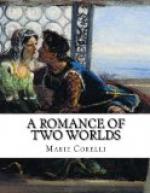In the present narration, which I have purposely called a “romance,” I do not expect to be believed, as I can only relate what I myself have experienced. I know that men and women of to-day must have proofs, or what they are willing to accept as proofs, before they will credit anything that purports to be of a spiritual tendency;— something startling—some miracle of a stupendous nature, such as according to prophecy they are all unfit to receive. Few will admit the subtle influence and incontestable, though mysterious, authority exercised upon their lives by higher intelligences than their own— intelligences unseen, unknown, but felt. Yes! felt by the most careless, the most cynical; in the uncomfortable prescience of danger, the inner forebodings of guilt—the moral and mental torture endured by those who fight a protracted battle to gain the hardly-won victory in themselves of right over wrong—in the thousand and one sudden appeals made without warning to that compass of a man’s life, Conscience—and in those brilliant and startling impulses of generosity, bravery, and self-sacrifice which carry us on, heedless of consequences, to the performance of great and noble deeds, whose fame makes the whole world one resounding echo of glory—deeds that we wonder at ourselves even in the performance of them—acts of heroism in which mere life goes for nothing, and the Soul for a brief space is pre-eminent, obeying blindly the guiding influence of a something akin to itself, yet higher in the realms of Thought.
There are no proofs as to why such things should be; but that they are, is indubitable. The miracles enacted now are silent ones, and are worked in the heart and mind of man alone. Unbelief is nearly supreme in the world to-day. Were an angel to descend from heaven in the middle of a great square, the crowd would think he had got himself up on pulleys and wires, and would try to discover his apparatus. Were he, in wrath, to cast destruction upon them, and with fire blazing from his wings, slay a thousand of them with the mere shaking of a pinion, those who were left alive would either say that a tremendous dynamite explosion had occurred, or that the square was built on an extinct volcano which had suddenly broken out into frightful activity. Anything rather than believe in angels—the nineteenth century protests against the possibility of their existence. It sees no miracle—it pooh-poohs the very enthusiasm that might work them.
“Give a positive sign,” it says; “prove clearly that what you say is true, and I, in spite of my Progress and Atom Theory, will believe.” The answer to such a request was spoken eighteen hundred years and more ago. “A faithless and perverse generation asketh for a sign, and no sign shall be given unto them.”




